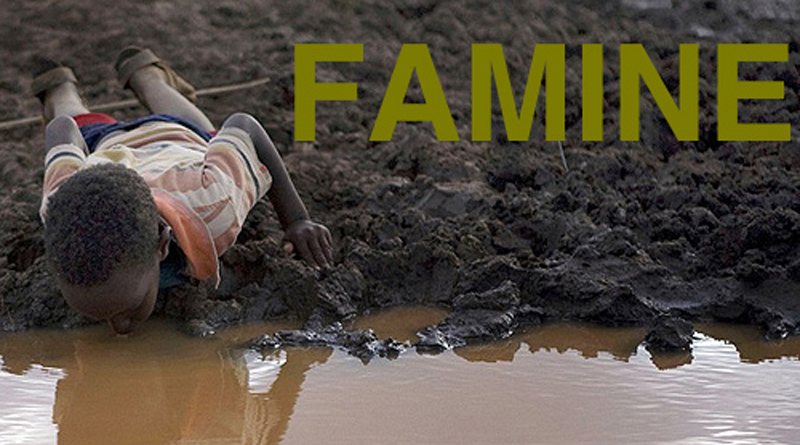ANALYSIS | Africa: Its high-time we pay for our climate, By Adam Alqali

“In order to fulfill my solemn duty to protect the United States and its citizens, the United States will withdraw from the Paris climate accord,” remarked President Donald J Trump, in his long-awaited televised briefing from White House’s Rose Garden on June 1, 2017.
This pronouncement effectively jumpstarted the 3-year long exit process for the United States – the world’s 2nd biggest emitter of greenhouse gases, after China – out of the Paris accord, a landmark agreement aimed at mitigating the effect of global warming. This was undeniably a huge blow to the international climate financing mechanism which helps developing countries manage risks and achieve resilience against climate change.
Climate change is real! It is the greatest existential threat to humanity’s environment thus, a human rights issue ending which – like ending slavery and apartheid – is a moral responsibility on all of us. Africa may not be responsible for more than 4% of global greenhouse gas emissions but, we, more than any other continent of the world, risk the most disastrous consequences of climate change. We must act and must do so now!
For the doubting Thomases, climate change, the biggest environmental hazard of our time, is no longer the business of scientists and environmentalists alone; its multifaceted threats are virtually across all aspects of our life: agriculture, health, economy, infrastructure and security. Therefore, global warming is our collective business, incontrovertibly, the future of our existence in Africa, to a large extent, is hinged on whether or not we are able to realize the potentially horrid catastrophe staring us in the face and begin to pay for our climate.
The Consequences
As Africans, we might have survived wars in Congo, Central African Republic, and Sudan as well as apartheid in South Africa; can we survive the increasingly looming threat of rising temperatures and it’s already manifested disastrous implications in the form of famines ravaging the Horn of Africa, South Sudan and the Lake Chad Basin?
The current humanitarian crisis in East Africa has put nearly 11 million people in Kenya, Ethiopia and Somalia in “dangerously hungry” position, according to the British charity Oxfam, and has been described as the “worst drought in living memory.” As fallout of the calamity, water is becoming scarcer in the region; animals are dying while people are always on the move fighting for survival.
Closer to home in Nigeria, the consequences of climate change meant the 25,000 square kilometers (9,700 square miles) Lake Chad Basin has shrunk to a twentieth of its size (1,500sq km; 580 sq ml) in the 1960s with disastrous effects on the 30 million people eking out a living around it: who survive off the lake through farming, livestock rearing and fishing.
No doubt, climate change, which has resulted in erratic rainfall whose effect is drought leading to low yield, livestock death and low fishing output and consequently, increased unemployment, poverty and migration, is at the heart of the region’s multidimensional crises. This has brought about increased restiveness among youth pushing them into the open arms of Boko Haram.
Way out
It is high-time Africa moves away from our increasingly harmful addiction to fossil fuels (coal, gas and oil) and instead embrace our vast renewable energy potentials: solar, wind, hydro etc. We must begin to consciously view combating climate change from the prism we viewed ending apartheid; this is the only way we can make everyone conscious of the need to take responsibility for climate change and not wait for the major polluters to save us.
The United States not been part of the Green Climate Fund anymore is a huge blow to international climate financing but also a clarion-call to all of us Africans to begin to look inward, by adopting innovative, reliable and sustainable solutions to our climate challenge. We must actively key into the global clean energy revolution. The future is clean, green and renewable!
As home to 26% of Africa’s entire renewable energy, Kenya is also one of the world’s leading countries in clean energy production; it hopes to make renewable energy 30% of its total energy portfolio by 2030. Other countries with huge energy needs like Nigeria, Ethiopia and South Africa must also come up with appropriate policy and regulatory frameworks to facilitate investment in green energy as well as make it easier for local firms and startups to invest in clean energy.
“Energy is to a country what oxygen is to the human body,” says Jakaya Kikwete, the President of Tanzania, by divesting away from fossil fuels and evolving effective financing mechanisms for renewable energy projects, Africa will also be providing access to sustainable, affordable and reliable energy to millions of its off-grid communities while at the same time combating climate change, in accordance with Goal 7 and Goal 13 of the Sustainable Development Goals.
Combating climate change is my business, it is certainly yours as well; we must all join the campaign to change the psyche of Africans to begin to adopt sustainable ways of life in business, transport, agriculture, and consumption – if there must be a tomorrow!
RESOURCES
http://m.dw.com/en/no-rain-and-too-little-drought-aid-in-ethiopia/a-18895934
http://www.allafrica.com/stories/201611211138.html
http://africannewspage.net/2016/06/faeos-first-conference-to-address-africas-energy-challenge/
http://www.cbsnews.com/news/climate-change-famine-poses-global-security-threat-un-warns/











